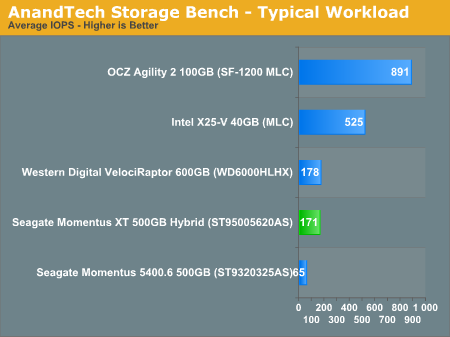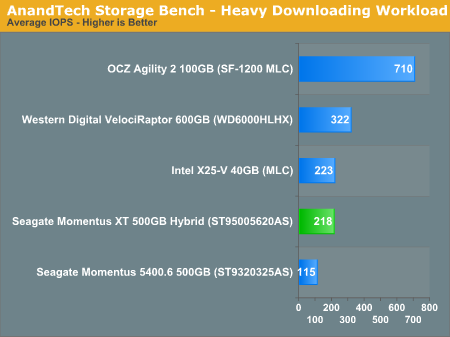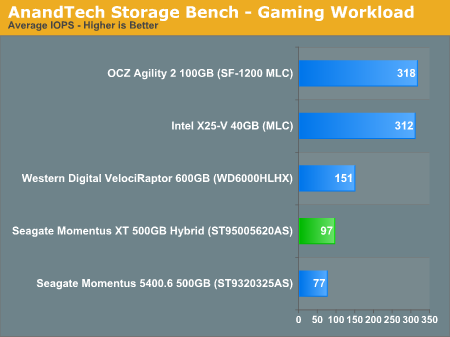Seagate's Momentus XT Reviewed, Finally a Good Hybrid HDD
by Anand Lal Shimpi on May 24, 2010 9:31 AM EST- Posted in
- Storage
- SSDs
- Seagate
- Momentus XT
- Hybrid Drive
- SSHDs
AnandTech Storage Bench
The first in our benchmark suite is a light usage case. The Windows 7 system is loaded with Firefox, Office 2007 and Adobe Reader among other applications. With Firefox we browse web pages like Facebook, AnandTech, Digg and other sites. Outlook is also running and we use it to check emails, create and send a message with a PDF attachment. Adobe Reader is used to view some PDFs. Excel 2007 is used to create a spreadsheet, graphs and save the document. The same goes for Word 2007. We open and step through a presentation in PowerPoint 2007 received as an email attachment before saving it to the desktop. Finally we watch a bit of a Firefly episode in Windows Media Player 11.
There’s some level of multitasking going on here but it’s not unreasonable by any means. Generally the application tasks proceed linearly, with the exception of things like web browsing which may happen in between one of the other tasks.
The recording is played back on all of our drives here today. Remember that we’re isolating disk performance, all we’re doing is playing back every single disk access that happened in that ~5 minute period of usage. The light workload is composed of 37,501 reads and 20,268 writes. Over 30% of the IOs are 4KB, 11% are 16KB, 22% are 32KB and approximately 13% are 64KB in size. Less than 30% of the operations are absolutely sequential in nature. Average queue depth is 6.09 IOs.
The performance results are reported in average I/O Operations per Second (IOPS):

Under typical multitasking workloads that aren't write intensive, the Momentus XT performs much like the new VelociRaptor. This isn't a typical notebook drive at all. We're still far away from even the cheapest SSDs though.
If there’s a light usage case there’s bound to be a heavy one. In this test we have Microsoft Security Essentials running in the background with real time virus scanning enabled. We also perform a quick scan in the middle of the test. Firefox, Outlook, Excel, Word and Powerpoint are all used the same as they were in the light test. We add Photoshop CS4 to the mix, opening a bunch of 12MP images, editing them, then saving them as highly compressed JPGs for web publishing. Windows 7’s picture viewer is used to view a bunch of pictures on the hard drive. We use 7-zip to create and extract .7z archives. Downloading is also prominently featured in our heavy test; we download large files from the Internet during portions of the benchmark, as well as use uTorrent to grab a couple of torrents. Some of the applications in use are installed during the benchmark, Windows updates are also installed. Towards the end of the test we launch World of Warcraft, play for a few minutes, then delete the folder. This test also takes into account all of the disk accesses that happen while the OS is booting.
The benchmark is 22 minutes long and it consists of 128,895 read operations and 72,411 write operations. Roughly 44% of all IOs were sequential. Approximately 30% of all accesses were 4KB in size, 12% were 16KB in size, 14% were 32KB and 20% were 64KB. Average queue depth was 3.59.

Crank up the sequential writes and you lose the benefit of the 4GB of SLC NAND on board the Momentus XT. It still delivers competitive performance with the X25-V thanks to the latter's limited write speeds, and it is faster than a conventional 2.5" drive as read operations still come off the NAND, but you don't get VelociRaptor performance out of it.
The gaming workload is made up of 75,206 read operations and only 4,592 write operations. Only 20% of the accesses are 4KB in size, nearly 40% are 64KB and 20% are 32KB. A whopping 69% of the IOs are sequential, meaning this is predominantly a sequential read benchmark. The average queue depth is 7.76 IOs.

As a benchmark that's bound by sequential read performance it's not surprising to see the Momentus XT not pull ahead here. Remember that we're limited by how quickly data can be streamed out of a single NAND device so you don't see a huge improvement in performance.










120 Comments
View All Comments
leexgx - Monday, May 24, 2010 - link
vista and windows 7 make an cache file so when it boots up it loads it into ram so when the programs request it its all ready in ram, it norm frees up approx 400MB on my system once the desktop has shown for more then 20-30 secsthe above can only be done after the first boot has happened (so second and 3rd boot are norm better as it now has history and this fie is remade every boot so the flash is likely not been used as its an new file every boot up as it tweeks it every boot)
superfetch and this preboot in windows 7 would of messed some of these results up an little
DominionSeraph - Monday, May 24, 2010 - link
Sounds more like Windows' boot optimization to me. If that's still an idle task in Windows 7, perhaps the 5400RPM drive isn't being allowed to idle long enough to process the boot defrag?jimhsu - Monday, May 24, 2010 - link
I've said that the future usage scenario of SSDs, barring any dramatic price decreases, will probably be as cache. (For example, ZFS: http://iablog.sybase.com/paulley/2008/08/flash-ssd... and I'm pretty certain the other big file systems such as NTFS and ext will follow). And http://arstechnica.com/civis/viewtopic.php?f=15&am... . Do such "hybrid drives" offer better performance, better reliability, or any other advantage over filesystem-level caching techniques?nortexoid - Monday, May 24, 2010 - link
There's not much point in the synthetic benchmarks besides showing how the drive performs on applications that you're not running frequently--i.e. to compare the hdd-minus-the-4gb-flash-cache performance of the drive, basically.I'd say these hybrid drives are the best of both worlds and hence the best drives currently on the market. Capacity plus speed at "little" more than a standard magnetic drive. Awesome
KingofL337 - Monday, May 24, 2010 - link
I really wish they could have used 8-16GB of FLASH. 4GB isn't enough to really speed up everything you use allot on your computer to SSD speeds. I think for most people 8-16GB could definitely nail down the common stuff.What would be really sweet is if some company would make a hybrid drive controller that could take a SSD and HDD, then slave them together and make a hybrid system. Then I could select the size SSD and HDD based on my performance requirements.
Shadowmaster625 - Monday, May 24, 2010 - link
Seagate can only do what makes them money. If they sell a lot of these then the design team will be allowed to continue improving and exploring additional options. If they dont sell well, well...What I want is a flash cache that stores all my 4K random writes in flash, and also stores in flash any 4K cluster that I access frequently. 16GB 4 channel MLC would cost about the same as 1 channel of 4GB SLC. But they would need to add wear leveling.
leexgx - Monday, May 24, 2010 - link
the idea of the drive is so that the Most common read LBA blocks on the disk get cached into the flash, the drive does not care if the Read was an file or not as its only looking at what Part of the disk was read the most and puts that onto the flashquite an good idea really
arthur449 - Monday, May 24, 2010 - link
Silverstone has been selling a SSD+HDD device like you describe.http://silverstonetek.com/products/p_contents.php?...
It would be interesting to see how this SSD/HDD "do-it-yourself" hybrid fairs against The Mighty Anandtech Storage Benchmark, and, if pairing a fast SSD with a fast HDD, would give us a truly seamless best of both worlds experience.
shin0bi272 - Monday, May 24, 2010 - link
If you have a velociraptor dont bother with this and buy a standard SSD to boot from.piroroadkill - Monday, May 24, 2010 - link
You'll be announcing the Barracuda's with this, say, 2TB, with 8-16GB cache, anytime soon, right?